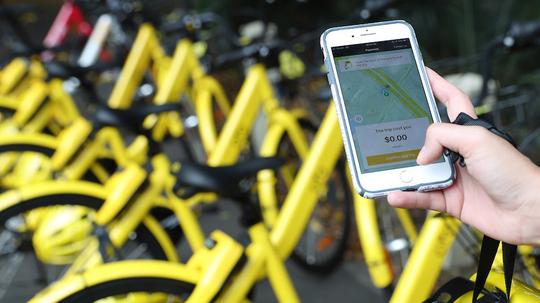
The City of Chicago has tweaked the rules of its dockless bike-sharing pilot, but it wasn't enough to satisfy two of the biggest dockless bike-sharing companies, Beijing-based Ofo and San Mateo, Calif.-based LimeBike, who are complaining that the city isn't doing enough to support their method of transit technology.
Chicago launched its six-month bike-sharing pilot on May 1 and said that all participating companies needed to incorporate "lock-to" technology by July 1. Meaning, any dockless bike that operates in Chicago needs to come with a U-lock or other locking mechanism that allows the bike to attach to a bike rack or other fixed structure.
However, on Friday, the Chicago Department of Transportation changed its regulations slightly, allowing bike-sharing companies that don't have lock-to technology to deploy up to 50 of their bikes in Chicago. Companies that do have lock-to tech on their bikes can operate up to 350 bikes in the city's pilot program, which runs until November.
The new rules heavily favor Boston-based Pace and Uber Jump, two companies operating in Chicago that have built-in locking technology. LimeBike and Ofo, on the other hand, say the city's rules put them at a disadvantage as their bikes don't have the ability to lock to a bike rack.
“A lock-to requirement is the wrong approach and will only cause a variety of unintended consequences,” said Marco McCottry, the head of North American operations at Ofo, in a statement on Friday. “We remain engaged with the city to increase this unfairly low cap and build a program that best serves riders."
Jessie Lucci, the general manager of LimeBike Chicago, said similar sentiments in a statement to Chicago Inno on Monday, calling the lock-to regulations unfair.
“It seems that CDOT is focused on tipping the scales for bikes using lock-to instead of letting residents on the South Side determine for themselves what kind of bike-share system they prefer to use,” Lucci said. “If the city is truly interested in providing the South Side with equity on bike-sharing, then they would place all operators in this pilot area on a level playing field instead of favoring lock-to bike-share companies.”
The lock-to regulations have been the most contentious issue surrounding Chicago's dockless bike-sharing pilot. The regulations, which are designed to help the city avoid bikes cluttering public spaces, defeat the purpose of the bikes being dockless, Ofo and LimeBike say. Dockless bikes—which, unlike Chicago’s Divvy bikes, aren’t stored at docking stations when they aren’t being used—have caused problems in other cities like Paris and Amsterdam, where bikes have gotten damaged or stolen.
Chicago’s dockless bike pilot has deployed at least 400 bikes from all four companies throughout 10 wards on the city’s South Side. The bikes can mainly be found in neighborhoods like Auburn Gresham, Chatham, Calumet Heights, Roseland, Pullman, Hegewisch, Beverly, Morgan Park, and Mt. Greenwood. The first dockless bike-share program in Illinois originally launched in April when LimeBike brought its service to Rockford.
Since the launch of Chicago’s dockless bike-sharing pilot, Pace has had the largest presence. They currently have five employees and operate 250 bikes in Chicago—the most bikes of any of the other three companies currently operating in the city.
“I think we’re doing a great job so far in Chicago,” said Dave Reed, expansion manager for Pace. “Our ridership has grown a lot. We’re seeing huge growth from week to week in ridership.”
Pace said it is looking to deploy 100 more bikes in Chicago to hit the 350 cap, but because of the lock-to rule, they’re trying to work with private property owners, the park districts and city government to install more public bike racks to accommodate them.
As part of that mission, Pace announced last week that it launched what it calls Pace Parking, a new parking platform, similar to a bike rack, for dockless bikes, electric bikes and scooters. Pace Parking is now available in Chicago, Austin and Bloomington, Ind.,—all cities with lock-to regulations.
“The lock-to technology is very important because it cuts down on the issues to do with dockless, like theft and vandalism,” Reed said. “We’re hoping to deploy more bikes once there’s more bike racks installed."
Reed said there’s a higher rate of people in Chicago using the bikes for transportation than recreational purposes compared to other cities. Nearly 60 percent of Pace rides are used for transportation, according to data from the company. Reed said that based on where bikes are left when rides are over, it’s clear that many are using them to ride to and from Chicago Transit Authority train stations on the South Side.
“We’re learning that having that last mile transportation connection in a lot of areas that are underserved by transit is really key and we’re serving a need there,” Reed said. “We’re also seeing ridership in many different parts of the community.”
Despite the challenges with dockless bikes, investors continue to pour money into them. According to Crunchbase, Ofo has raised $2.2 billion in venture capital funding, LimeBike has raised $383 million and Zagster, the parent company of Pace, has raised more than $31 million. Additionally, Uber acquired Jump in April for around $200 million.








